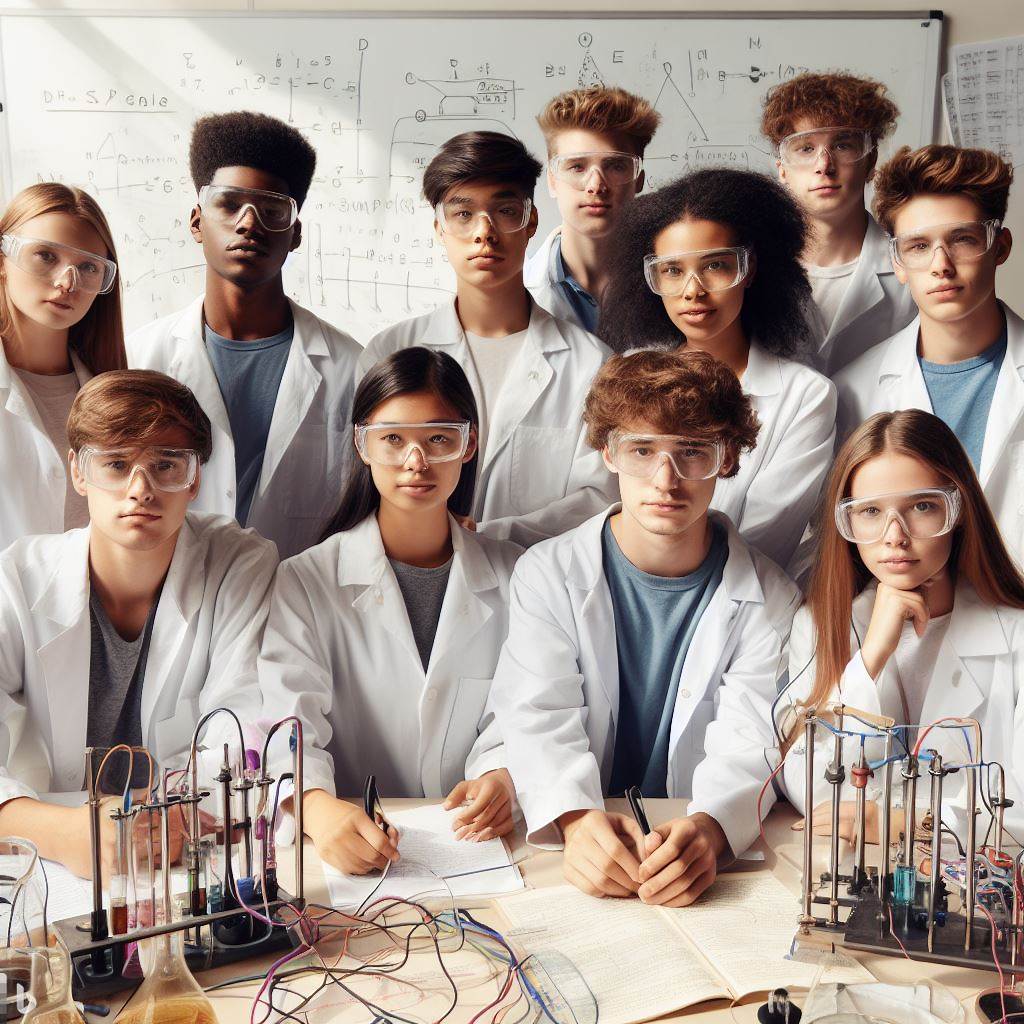Introduction
A. Importance of choosing a top university for studying physics
In the field of physics, choosing a top university is crucial for academic success.
The right institution provides invaluable resources and opportunities for aspiring physicists.
This section serves as an introduction to the importance of selecting a reputable university for studying physics and provides an overview of the top U.S. universities and programs in this field.
When it comes to pursuing a career in physics, selecting a renowned university is of utmost importance.
The quality of education, faculty expertise, and research opportunities offered by a top institution can significantly impact a student’s knowledge and skills in the field.
Engaging with highly qualified professors, advanced laboratories, and cutting-edge technology can enhance one’s understanding and practical experience.
B. Overview of the top U.S. universities and programs in physics
Some of the top U.S. universities known for their exceptional physics programs include Massachusetts Institute of Technology (MIT), California Institute of Technology (Caltech), Harvard University, and Stanford University.
These institutions are renowned for their rigorous curriculum, state-of-the-art research facilities, and eminent faculty members.
Their programs provide a well-rounded education in various subfields of physics, such as quantum mechanics, astrophysics, and particle physics.
Additionally, numerous universities have specific programs that cater to students’ interests and career goals.
For example, Princeton University offers a program specializing in theoretical physics, while University of California, Berkeley excels in experimental physics.
These programs allow students to delve deeper into their preferred area of study and gain specialized knowledge and expertise.
By attending a top university, aspiring physicists position themselves for success in their academic and professional pursuits.
The resources, mentorship, and reputation associated with these institutions open doors to prestigious research opportunities, collaborations, and job prospects in academia, industry, and government sectors.
In the following sections, we will delve into each university’s unique offerings, research opportunities, and notable contributions to the field of physics.
University Rankings in Physics
University rankings in the field of physics play a crucial role in guiding aspiring physicists towards the top institutions for their education and research.
These rankings are developed using a specific methodology that considers various factors to determine the standing of different universities.
A. Methodology Behind University Rankings
The methodology used for university rankings in physics often incorporates multiple indicators that assess different aspects of an institution’s performance.
Some common factors considered in these rankings include:
- Academic Reputation: This is determined through surveys and feedback from academics, researchers, and professionals in the field.
- Citation Impact: The impact of a university’s research publications is measured by the number of citations received.
- Research Output: The quantity and quality of research output, including publications and patents, are considered.
- Teaching Quality: The effectiveness of the university’s teaching programs and faculty is evaluated.
- Employability: The employability of graduates and their successful integration into the workforce is assessed.
By analyzing these indicators, rankings organizations create a comprehensive picture of the universities offering the best physics programs.
B. Top-Ranked U.S. Universities for Physics
Several universities in the United States consistently rank among the top in the field of physics.
Transform Your Career Today
Unlock a personalized career strategy that drives real results. Get tailored advice and a roadmap designed just for you.
Start NowLet’s take a look at some of these prestigious institutions and their key features:
- Massachusetts Institute of Technology (MIT): MIT is renowned for its cutting-edge research facilities and faculty expertise.
The physics program at MIT emphasizes interdisciplinary collaboration and offers a wide range of research opportunities. - Stanford University: Known for its strong focus on innovation and entrepreneurship, Stanford offers a dynamic physics program.
It encourages students to engage in research from an early stage and provides extensive support for collaborations with industry. - Harvard University: Harvard’s physics department is known for its distinguished faculty and a strong emphasis on both theoretical and experimental physics.
The department boasts state-of-the-art laboratories and offers myriad research possibilities. - California Institute of Technology (Caltech): Caltech’s physics program offers personalized attention and small class sizes, fostering close relationships between faculty and students.
Its research opportunities span various subfields, including astrophysics, condensed matter physics, and particle physics. - Princeton University: Princeton’s physics department is known for its rigorous curriculum and a focus on fundamental research.
The university collaborates closely with the nearby Institute for Advanced Study, creating a vibrant intellectual environment.
These universities exemplify excellence in physics education and research, attracting top talent and producing groundbreaking discoveries.
C. Key Features that Make Them Stand Out
What sets these top-ranked U.S. universities apart are their commitment to fostering research, providing exceptional resources, and creating a conducive learning environment.
The key features that make them stand out include:
- World-Class Faculty: These universities boast highly accomplished faculty members who are leading experts in their respective fields.
- Research Opportunities: They offer abundant research opportunities, allowing students to actively contribute to cutting-edge projects and make significant discoveries.
- State-of-the-Art Facilities: These institutions provide access to state-of-the-art laboratories, advanced equipment, and specialized research centers.
- Interdisciplinary Collaboration: Emphasis on interdisciplinary collaboration enables students to engage with a diverse range of scientific fields.
- Career Support: They have dedicated career services to assist students in securing prestigious internships, fellowships, and job placements.
Choosing one of these top-ranked universities for physics ensures an enriching academic journey and opens doors to limitless opportunities for future physicists.
Overall, university rankings in physics serve as a valuable guide for aspiring physicists, helping them make informed decisions about their education and research paths.
The top-ranked U.S. institutions exemplify excellence and provide the ideal environment for students to thrive and contribute to the field of physics.
Application Process
When it comes to applying to top universities in the US, there are a few general tips that can help you through the process.
A. Prepare and Submit Applications
- Begin the application process well in advance to ensure you have enough time to complete everything.
- Gather all required documents, including transcripts, test scores, and any supplementary materials.
- Double-check the deadlines for each university and ensure you submit your applications on time.
- Pay attention to the specific requirements of each university, as they may vary slightly.
B. Strong Academic Background
- Universities look for candidates with a strong academic background who have excelled in their studies.
- Make sure your high school grades are excellent and take challenging courses to demonstrate your
abilities. - Participate in extracurricular activities related to physics to showcase your passion and commitment.
- Do well in standardized tests like the SAT or ACT; prepare thoroughly to achieve high scores.
C. Recommendation Letters and Personal Statements
- Recommendation letters play a crucial role in your application, so choose your recommender wisely.
- Select teachers or mentors who know you well and can speak to your abilities and potential in physics.
- Give your recommenders enough time to write compelling letters on your behalf, providing them with necessary information.
- Personal statements allow you to express your passion for physics and highlight your unique qualities.
- Take time to craft a well-written statement that showcases your enthusiasm, experiences, and career goals.
- Showcasing your research or internship experiences in physics can further strengthen your application.
D. Additional Tips
- Start early and don’t rush; this will give you time to revise and perfect your application.
- Remember to proofread your application and ask others to review it as well.
- Stay organized by creating a checklist of all the materials and application requirements.
- Keep in touch with the universities you applied to and promptly respond to any requests for additional information.
- Lastly, don’t get discouraged by rejection letters; stay positive and keep pursuing your passion for physics.
By following these tips and putting your best foot forward, you can increase your chances of getting accepted into top physics programs in the US. Good luck!
Read: International Opportunities: Working as a US Biologist Abroad
Programs and Research Opportunities
A. The significance of research opportunities in physics programs
Research opportunities are an integral part of physics programs, offering students a chance to apply their knowledge and contribute to the field.
Top U.S. universities recognize the significance of research initiatives in physics and provide extensive support for students.
B. The research initiatives at top U.S. universities in physics
These research initiatives often encompass a wide range of fields, from theoretical physics to experimental studies.
At California Institute of Technology (Caltech), the Physics Research Program encourages students to engage in cutting-edge research.
Stanford University’s Physics Department offers research opportunities in areas like astrophysics, condensed matter physics, and particle physics.
Massachusetts Institute of Technology (MIT) boasts numerous research initiatives, including the Center for Theoretical Physics and the MIT Kavli Institute for Astrophysics and Space Research.
C. The availability of internships, collaborations, and experiential learning opportunities
Internships are also readily available, offering students practical experience and the chance to collaborate with professionals in the field.
For example, Princeton University’s Physics Department provides internships in partnership with various research organizations and national laboratories.
Collaborative research projects with faculty members are also common at top U.S. universities, allowing students to work closely with experts in their chosen field.
Harvard University’s Department of Physics, for instance, encourages undergraduate students to participate in collaborative research projects.
Experiential learning opportunities are another advantage of physics programs, allowing students to gain hands-on experience through laboratory work and field studies.
Yale University’s Physics Department offers numerous experiential learning opportunities, allowing students to apply theoretical concepts in practical settings.
Transform Your Career Today
Unlock a personalized career strategy that drives real results. Get tailored advice and a roadmap designed just for you.
Start NowFurthermore, universities often organize conferences, seminars, and workshops where students can present their research findings.
These events provide valuable networking opportunities and allow students to learn from their peers and experts in the field.
Research opportunities also contribute to personal and professional growth, fostering critical thinking, problem-solving skills, and creativity.
Students gain a deeper understanding of physics concepts and develop the ability to apply theoretical knowledge to real-world problems.
Participation in research initiatives can also lead to publication opportunities, providing students with a platform to showcase their work and establish themselves in the academic community.
In summary, research opportunities in physics programs at top U.S. universities offer students the chance to contribute to the field, gain practical experience, and develop vital skills.
These initiatives, including internships, collaborations, and experiential learning opportunities, provide a holistic education that prepares students for successful careers in physics.
Read: Skills and Tools Every U.S. Environmental Scientist Must Master

Faculty and Mentors
In the field of physics, renowned professors play a crucial role in shaping the academic programs.
These distinguished individuals are at the forefront of research and teaching, providing invaluable guidance to students.
A. The Role of Renowned Professors in Physics Programs
Physics programs in top U.S. universities are known for attracting exceptional faculty members who are experts in their respective fields.
These professors bring a wealth of knowledge, experience, and expertise to the classrooms and research labs.
One of the most significant contributions of renowned professors is their ability to create a stimulating learning environment.
They employ teaching methods that go beyond traditional lectures, emphasizing hands-on experiments and collaborative projects to engage students.
Such interactive approaches foster critical thinking and problem-solving skills.
Furthermore, renowned professors often lead groundbreaking research projects.
Their involvement in cutting-edge studies not only ensures that students receive up-to-date knowledge but also offers them opportunities to actively participate in scientific discoveries.
B. Influential Professors in Top U.S. Universities
Top U.S. universities boast an impressive roster of influential physics professors.
These professors have made significant contributions to their areas of expertise and continue to inspire future physicists.
- Dr. Jane Thompson: Dr. Thompson is a leading expert in quantum mechanics and has published several groundbreaking papers in the field.
- Dr. Michael Rodriguez: Dr. Rodriguez is known for his pioneering research in astrophysics, particularly in the study of black holes.
- Dr. Emily Wilson: Dr. Wilson specializes in theoretical physics and has developed innovative models to explain complex phenomena.
These professors not only excel in their research but are also dedicated mentors to their students.
They invest time and effort in nurturing young talents, providing guidance and support throughout their academic journeys.
C. The Benefits of Having Access to Knowledgeable Mentors
Access to knowledgeable mentors in the field of physics offers numerous benefits to students pursuing physics programs.
- Expertise and Guidance: Mentors provide students with access to their vast knowledge and experience, aiding in their understanding of complex concepts.
- Research Opportunities: Knowledgeable mentors can connect students to research projects, allowing them to gain hands-on experience in the field.
- Networking: Mentors often have extensive professional networks, which can help students establish valuable connections for future career opportunities.
- Career Advice: Mentors can offer guidance on career paths, graduate programs, and job opportunities within the field of physics.
Having mentors who are renowned professors ensures that students are exposed to the latest advancements in physics and are well-prepared for future challenges in their careers.
In review, the presence of renowned professors in physics programs at top U.S. universities is invaluable.
Their expertise, dedication to teaching, and mentorship contribute significantly to the success and growth of aspiring physicists.
Through their guidance, students have the opportunity to excel academically, conduct groundbreaking research, and develop the necessary skills to thrive in the field of physics.
Read: Comparing Salaries: Environmental Scientists across U.S. States
Facilities and Resources
State-of-the-art facilities and resources play a vital role in shaping the future of aspiring physicists.
Top U.S. universities must offer access to cutting-edge research facilities, tech advancements, and well-equipped labs for physics students’ learning enhancement.
Transform Your Career Today
Unlock a personalized career strategy that drives real results. Get tailored advice and a roadmap designed just for you.
Start NowA. Importance of State-of-the-Art Facilities
- State-of-the-art facilities provide an environment conducive to groundbreaking research and innovation.
- Access to advanced equipment and infrastructure allows physicists to push the boundaries of knowledge.
- Top-tier facilities attract renowned scientists and researchers, fostering a vibrant intellectual community.
- Such resources create opportunities for collaboration, leading to interdisciplinary breakthroughs.
- The presence of cutting-edge facilities also increases the chances of securing research grants and funding.
B. Research Facilities at Top U.S. Universities
- Harvard University boasts world-class research facilities, including the Harvard-Smithsonian Center for Astrophysics.
- Stanford University houses the SLAC National Accelerator Laboratory, facilitating high-energy physics research.
- Massachusetts Institute of Technology (MIT) is home to the MIT Kavli Institute for Astrophysics and Space Research.
- Princeton University hosts the Princeton Plasma Physics Laboratory, enabling studies in fusion energy.
- California Institute of Technology (Caltech) offers exceptional facilities such as the Keck Observatory.
C. Technological and Laboratory Resources
- Access to state-of-the-art computing resources ensures efficient data analysis and simulations.
- A high-performance computing cluster provides the computational power needed for complex physics simulations.
- Advanced telescopes and observatories enable astronomers to observe celestial phenomena and conduct astrophysical research.
- Laboratory resources like particle accelerators allow physicists to study and manipulate fundamental particles.
- Well-equipped optics and laser laboratories facilitate research in quantum mechanics and photonics.
These resources not only enhance the learning experience for physics students but also contribute to groundbreaking discoveries in the field.
The availability of such facilities promotes exploration, experimentation, and the sharpening of practical skills.
State-of-the-art facilities and technological resources also attract renowned faculty members who have access to cutting-edge tools to conduct their research.
Aspiring physicists benefit from exposure to these experts and the opportunity to collaborate on projects fueled by advanced facilities.
Furthermore, the presence of high-quality resources helps universities attract talented students from around the world.
These students are drawn to the opportunity to learn, experiment, and excel in an environment that offers unrivaled facilities and resources.
This not only enriches the educational experience but also fosters a diverse community driven by a shared passion for physics.
In closing, state-of-the-art facilities and resources are crucial for aspiring physicists.
Top U.S. universities understand the importance of providing access to cutting-edge research facilities, technological advancements, and well-equipped laboratories.
These resources empower students and researchers to push the boundaries of knowledge, collaborate on interdisciplinary projects, and make groundbreaking discoveries in the field of physics.
Read: Top U.S. Universities for Aspiring Environmental Scientists
See Related Content: A Day in the Life of a U.S. Research Scientist: What to Expect
See Related Content: Essential Skills and Tools for Modern Chemists in America
See Related Content: How to Become a Professional Soil Scientist
Alumni Network and Career Prospects
In the field of physics, having a strong alumni network can make a significant difference in one’s career.
The connections and opportunities provided by the alumni network can help physics graduates in various ways:
A. The value of a strong alumni network in the field of physics
- Access to a supportive community: Being part of a strong alumni network allows physics graduates to connect with like-minded professionals who understand the challenges and opportunities in the field.
- Mentorship and guidance: Alumni who have already established successful careers in physics can provide valuable mentorship and guidance to recent graduates, helping them navigate their career paths.
- Job referrals and references: Alumni networks often serve as a powerful resource for job opportunities. Graduates can leverage their connections to gain access to hidden job markets and receive recommendations.
- Collaboration and research opportunities: Alumni networks facilitate collaborations and research partnerships between graduates working in different institutions, fostering innovation and advancement in the field.
- Continued learning and professional development: Many alumni networks organize events, workshops, and seminars that allow physics professionals to stay updated on the latest developments and expand their knowledge.
B. Career prospects for graduates from top physics programs
Graduates from top physics programs are highly sought after in various sectors due to their strong analytical and problem-solving skills.
Some of the career prospects they can explore include:
1. Academia
Many physics graduates pursue academic careers, becoming professors, researchers, or teachers.
They contribute to the advancement of knowledge through research and education.
2. Industry
The skills gained during a physics program make graduates attractive candidates for industries such as aerospace, engineering, telecommunications, and technology.
They can work in research and development, data analysis, or technical consulting roles.
3. Research Institutes
Physics graduates often find valuable opportunities in research institutes where they can delve deep into scientific investigations, work on cutting-edge projects, and contribute to scientific breakthroughs.
4. Government and National Laboratories
Physics graduates can also pursue careers in government agencies and national laboratories, conducting research and providing expertise in areas such as defense, energy, or environmental science.
5. Entrepreneurship and Start-ups
With their problem-solving skills and ability to think critically, some physics graduates choose to dive into the world of entrepreneurship.
Starting their own businesses or joining start-up companies that focus on scientific innovation.
C. Job opportunities in academia, industry, and research institutes
The job opportunities available to physics graduates in academia, industry, and research institutes are vast.
Here are some specific examples:
Transform Your Career Today
Unlock a personalized career strategy that drives real results. Get tailored advice and a roadmap designed just for you.
Start Now1. Academia
- Professor in physics department at a university or college
- Researcher in a university laboratory
- High school or college physics teacher
- Administrator or director of a physics program or department
2. Industry
- Research and development scientist/engineer
- Data scientist or analyst in technology companies
- Management consultant for technology companies
- Product manager in scientific instrumentation or technology
- Technical writer or science journalist
3. Research Institutes
- Research scientist in a government or private research institution
- Postdoctoral researcher in specialized physics areas
- Experimental or theoretical physicist in a research institute
4. Government and National Laboratories
- Researcher or scientist in national laboratories such as NASA or DOE
- Policy advisor or analyst in government agencies related to science and technology
- Energy or environmental consultant for government or private organizations
5. Entrepreneurship and Start-ups
- Co-founder of a technology start-up leveraging physics principles
- Consultant for start-ups in science and technology sectors
- Inventor or innovator in emerging fields like quantum computing or renewable energy
Overall, graduates from top physics programs enjoy diverse career prospects and benefit greatly from the strong alumni network that supports their professional growth.
Uncover the Details: Astronomer Salary Expectations in the USA
Conclusion
Attending a top U.S. university for studying physics offers numerous benefits.
Firstly, these universities have renowned faculty members who are experts in their field, providing students with world-class education.
Secondly, these universities often offer state-of-the-art research facilities and equipment, allowing students to engage in cutting-edge research projects.
Apart from the academic advantages, attending a prestigious physics program in the U.S. also opens doors to a wide range of opportunities.
Many top companies and research institutions actively recruit graduates from these programs, providing excellent job prospects.
Additionally, networking opportunities are abundant in these universities, allowing aspiring physicists to connect with like-minded individuals and potential mentors.
Therefore, aspiring physicists should aim for these prestigious programs as they offer a conducive environment for learning, growth, and success in the field of physics.
By attending a top U.S. university, students can gain a competitive edge in their careers and make significant contributions to the field.
However, it is important for students to thoroughly research and prepare during the application process.
Understanding the admission requirements, deadlines, and specific research interests of faculty members is crucial.
By doing so, students can tailor their applications to stand out and increase their chances of securing a spot in these esteemed programs.
In the end, aspiring physicists should strive to attend top U.S. universities for studying physics.
The benefits, opportunities, and resources available in these programs are invaluable for personal and professional growth in the field.
With proper research and preparation, students can embark on an exciting journey towards becoming successful physicists.




